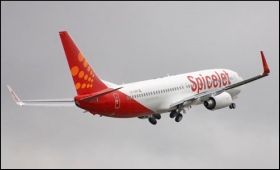|
|
|

|
SpiceJet to be first to import aviation fuel: Ajit Singh
|
|

|
|
| Top Stories |
 |
|
|
|
Rohit Vaid | 02 Jul, 2013
A year after allowing domestic airlines to directly import aviation fuel to save on costs, Civil Aviation Minister Ajit Singh has said that he expected budget carrier SpiceJet to be the first to opt for this.
"We have allowed them (airlines) to directly import fuel by entering into tie-ups with other companies. I expect SpiceJet to be the first to directly import the fuel. When they will start is up to them," Ajit Singh told reporter in an interview.
SpiceJet was also the first private carrier to get approval to directly import fuel.
The approval was granted by the Director General of Foreign Trade under the Ministry of Commerce and Industry, clearing the airline's application to source aviation turbine fuel directly from overseas suppliers, a top company official said Wednesday.
Last year, the company's chief executive officer Neil Mills had said that the carrier was negotiating with leading oil marketing companies to start directly importing fuel.
A ministerial group headed by then Finance Minister Pranab Mukherjee had Feb 22, 2012, allowed domestic airlines to directly import fuel, which till that time came under the restricted import list and could only be imported by certain public sector units.
The move was said to enable airlines to cut operating costs by about 10-15 percent.
Even the Airports Authority of India (AAI) had said it will form a joint ventures with airlines, state-run units and Reliance Industries to provide cheaper fuel.
Currently, ATF sold in the country is nearly 50-60 percent costlier than in overseas markets like Bangkok, Singapore or Dubai as an additional 4-34 percent state sales tax hikes the prices.
Ajit Singh also said his ministry was working on a mechanism to bring the sales tax to a uniform four percent, a move the industry says will considerably bring down prices.
Fuel comprises about 50 percent of the total operating costs of airlines in India.
High fuel prices have dented the Indian civil aviation sector as major airlines bleed under the high sales tax regime. Fares are also increased time-to-time on the pretext of the soaring fuel prices.
|
|
|
| |
|
|
|
|
|
|
|
|
|
|
|
|
|
|
| |
| Customs Exchange Rates |
| Currency |
Import |
Export |
US Dollar
|
₹91.35
|
89.65 |
UK Pound
|
₹125.3
|
₹121.3 |
Euro
|
₹108.5
|
₹104.85 |
| Japanese
Yen |
₹58.65 |
₹56.8 |
| As on 19 Feb, 2026 |
|
|
| Daily Poll |
 |
 |
| What is your primary "Make or Break" expectation from the Finance Minister this year? |
|
|
|
|
|
| Commented Stories |
 |
|
|
|
|
|
| |
|